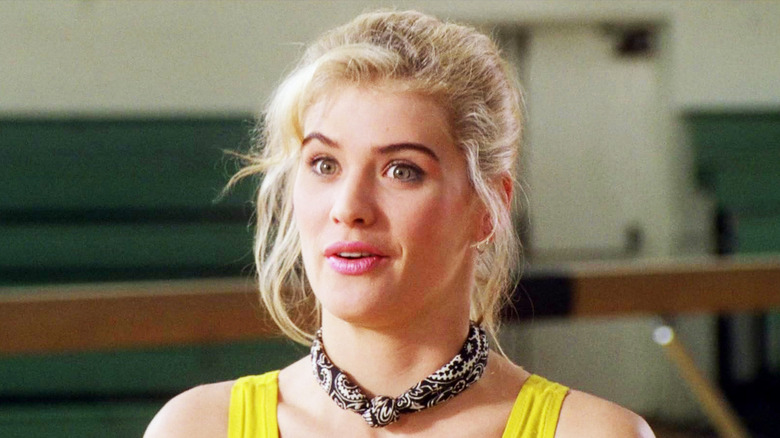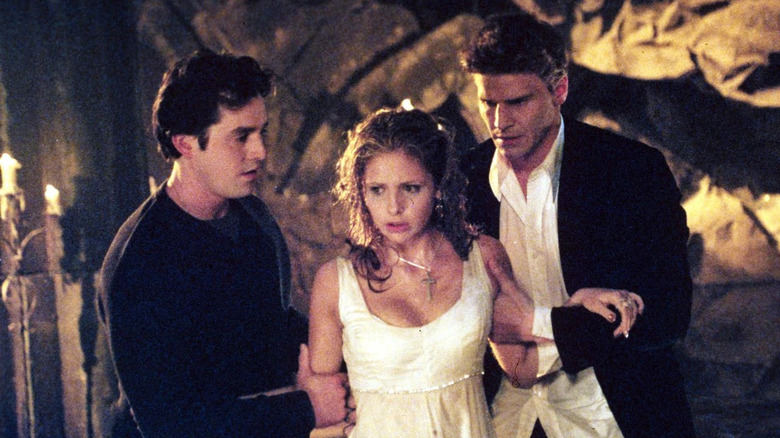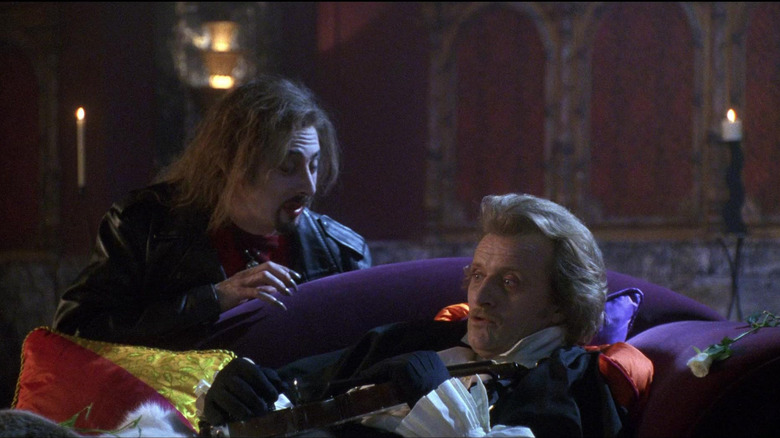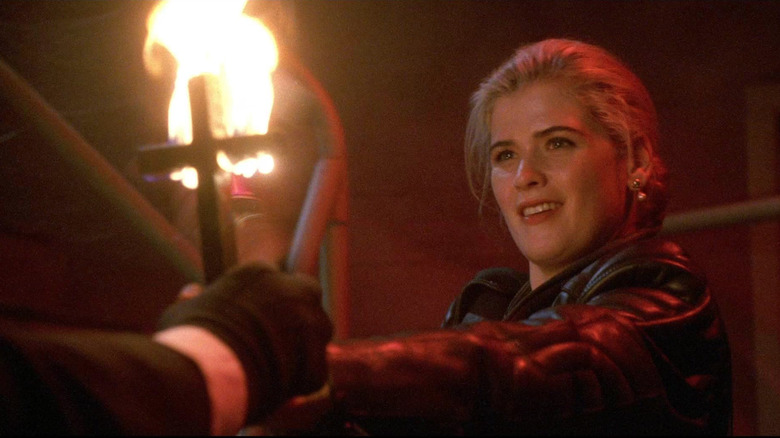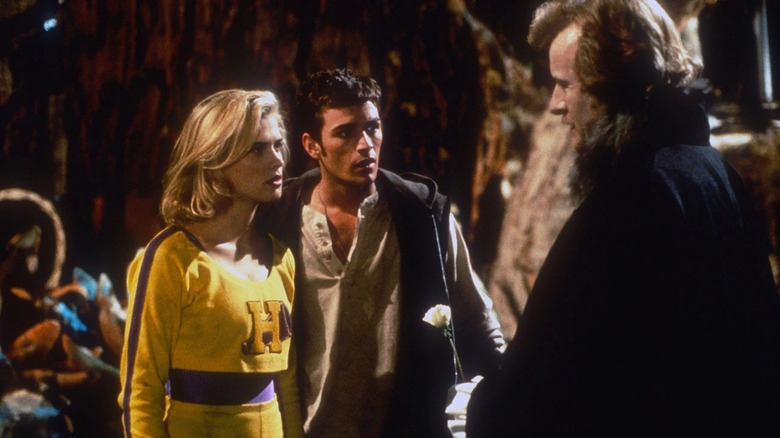Is The Much-Derided Buffy The Vampire Slayer Movie Canon? It's Complicated
When you think of "Buffy the Vampire Slayer," you probably think of the hit TV series that introduced an entire generation of '90s kids to the metaphor of high school being like a horror movie. But if you happened to come of age in the early '90s, you might well remember your first introduction to the character of The Slayer coming with 1992's "Buffy the Vampire Slayer" movie.
Written by Joss Whedon, who eventually became showrunner on the TV series, and directed by Fran Rubel Kuzui, the film starred Kristy Swanson as the titular slayer and was a decidedly lighthearted affair, especially in comparison to the show that succeeded it. Co-starring Luke Perry and featuring a surprisingly impressive cast that included Donald Sutherland, Rutger Hauer, Hilary Swank, and Paul Reubens, "Buffy the Vampire Slayer" '92 debuted to unfavorable reviews and was sadly relegated to a footnote in "Buffy" history once the show debuted in '97.
But in recent years, the movie has enjoyed a reappraisal, with some, including /Film's own BJ Colangelo, arguing that the movie version of "Buffy the Vampire Slayer" is actually good. That's especially true if you look at the film as a standalone project, entirely separate from the TV series. When viewed on its own, it's a campy delight entirely worthy of its place in the overall vampire movie canon.
The thing is, though, '92's "Buffy" isn't entirely a standalone film. In fact, there's a good case to be made that the movie is very much part of "Buffy" canon.
Shifting perspectives
For a long time, the prevailing view of 1992's "Buffy The Vampire Slayer" was not only that it was a misstep, but that it wasn't canon to the vastly superior TV series. But alongside shifting opinions of the film, the truth about its relevance to "Buffy" canon has developed into a more nuanced issue.
Loving "Buffy the Vampire Slayer" has become complicated in recent years due to what multiple actors, including star Sarah Michelle Gellar, have claimed was the toxic nature of its set and showrunner, Joss Whedon. But the show remains hugely influential and a source of fond memories for an entire generation that remember the thrill of tuning into the Scooby Gang's exploits each week. We grew up watching a cool show about a vampire slayer only to become engrossed in a world that explored real-world issues and felt surprisingly meaningful despite its more fanciful elements.
The movie might not enjoy that same legacy, but whether fans of the show like it or not, it's forever tied to the series that became such a massive hit — and not just because it gave us the first draft of Buffy Summers.
'It didn't turn out to be the movie I had written'
Joss Whedon famously disliked the film that was produced from his script. As he told The A.V. Club back in 2001:
"It didn't turn out to be the movie that I had written. They never do, but that was my first lesson in that. Not that the movie is without merit, but I just watched a lot of stupid wannabe-star behavior and a director with a different vision than mine — which was her right, it was her movie — but it was still frustrating. Eventually, I was like, 'I need to be away from here.'"
You might think Whedon would have completely stricken the film from the "Buffy" record once he started running the TV version — especially since, as he told The A.V. Club, he was given "an unprecedented amount of control over the show, even for television." Except, he didn't. In fact, the series directly refers to the events of the movie.
In the first episode, "Welcome to the Hellmouth," (which replaced a less than stellar unaired pilot) Buffy moves from LA — the setting of the movie — to the fictional Sunnydale, where she tells her high school principal that she previously burned down a gym "full of vamp ... uh, asbestos." That's a reference to Whedon's original movie script, which culminated in the slayer setting fire to her high school gym to kill Rutger Hauer's vampire king Lothos, before the studio cut that whole section. Then in season 2, Buffy's original watcher Merrick (originally portrayed by Donald Sutherland) shows up, this time played by Richard Riehle. It might not be directly tied to the film, then, but the Buffy of the TV show clearly shares history with her film counterpart.
The origin
You get the sense that while Whedon might not consider the 1992 movie itself canon, he at least considered his screenplay part of Buffy's history. In many ways, the film is Hollywood's version of what actually happened in the Buffy-verse of the show. The events transpired, but perhaps not in quite the campy way the film depicted. Which is why Whedon cosigned a comic book series written by Dan Brereton and Christopher Golden entitled "The Origin," which retold the events of the '92 movie in a way that was faithful to the tone of the show. In a 1999 post on "The Bronze," the message board for the official "Buffy" series website, the show creator wrote:
"The origin comic, though I have issues with it, CAN pretty much be accepted as canonical. They did a cool job of combining the movie script (the SCRIPT) with the series, that was nice, and using the series Merrick and not a certain OTHER thespian who shall remain hated."
That "other thespian," for those interested was Donald Sutherland, who Whedon infamously struggled to work with on the movie.
At one point, there were plans to remake the "Buffy the Vampire Slayer" film as a "darker, event-sized movie" (as Reuters reported back in 2009), with Fran Rubel Kuzui returning to direct. Which, considering how far the '92 movie strayed from the originally-intended tone, might not have been all that bad an idea, especially if it hewed closer to "The Origin." Probably best not to let Rubel Kuzui have another crack at it, though.
This one's up to the fans
Just as the "Buffy the Vampire Slayer" show transcended the teen drama and horror genres that underpinned its diverse storytelling, it has at this point transcended Joss Whedon. "Buffy" was Whedon's brainchild, and his fastidious control of the series ensured his vision was realized correctly. But 20 years after it wrapped up, the show now belongs to its fans and the people who worked under such challenging conditions to bring it to the masses. With that in mind, whatever Whedon says about "Buffy" canon somehow doesn't seem to carry all that much weight anymore.
So, fellow Buffy geeks, it is what you want it to be. Can we say with 100 percent accuracy that 1992's "Buffy the Vampire Slayer" remains canonical to the show? Not really. But if you want it to be, then in this era of reappraisal, where fans can claim "Buffy" '92 as one of the best vampire films of all time, there's certainly a good case to be made for it being part of the overall Buffy canon. And if it goes against whatever Joss Whedon says, then there's even more reason to make that case.
